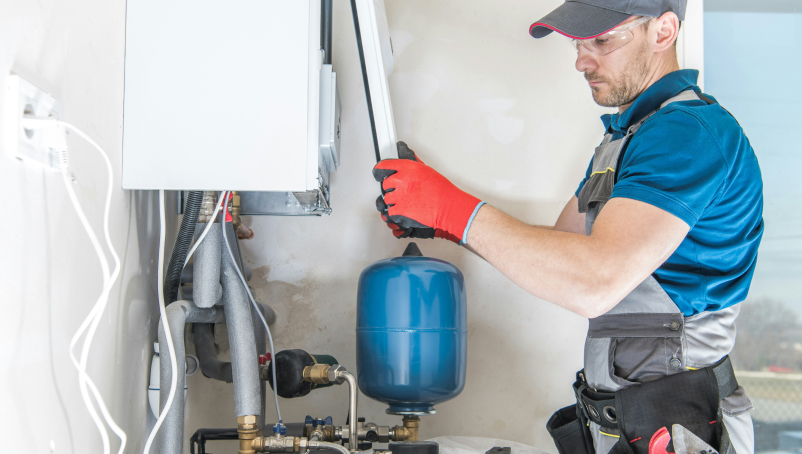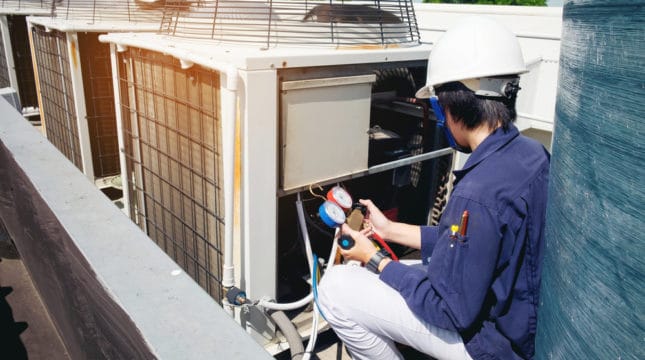Do you need an Ohio HVAC license to perform HVAC work?
You’ll go through the Ohio Construction Industry Licensing Board (OCILB) for licensure as an HVAC contractor. But you may only need their stamp of approval if you plan to work on commercial buildings. That’s because local building and health departments are in charge of residential HVAC contractors.
Some jurisdictions, like the city of Columbus and Cleveland, require you to have a state-level Ohio HVAC license, so don’t be surprised if they ask you for it, even if you’re sticking to residential work.
EPA Certification
Ohio HVAC technicians must obtain the EPA 608 Certification to work with refrigerants. This certification, issued by the Environmental Protection Agency, ensures technicians understand refrigerants’ proper handling and disposal.
There are different levels of certification, including Type I (for small appliances), Type II (for high-pressure systems), and Type III (for low-pressure systems). To get certified, you must pass an exam covering federal regulations, refrigerant types and safety procedures. If you want to work with refrigerants, this is one of the most common HVAC certifications to obtain.
Insurance requirements for an Ohio HVAC license
HVAC insurance protects you, your team, and your business from unexpected setbacks. While Ohio requires only general liability coverage, smart contractors usually grab a more complete insurance package to cover all their bases.
Workers’ Compensation insurance
Ohio law requires workers’ comp if you’ve got employees — even just one employee. It helps handle medical expenses and lost wages if someone gets hurt on the job.
However, unlike most U.S. states, Ohio does not allow small businesses to buy private worker’s compensation insurance (i.e., coverage provided by a commercial insurance company); it’s a monopolistic state. Instead, companies must buy their worker’s compensation from the Ohio Bureau of Workers’ Compensation. Alternatively, they can become a certified self-insured employer.
Learn more about workers’ compensation for contractors.
General Liability insurance
This is the coverage that HVACR contractors must have in Ohio. The OCILB needs to see at least $500,000 in liability coverage before handing over your license. This insurance helps cover things like property damage or injuries to customers during your work.
Learn more about general liability insurance for contractors.
Commercial Property insurance
Commercial property insurance helps protect your business space and everything in it, from your office or storage building to equipment and inventory. It covers the cost of damage from fire, break-ins, and other mishaps.
Business Owner’s Policy
A business owner’s policy, or BOP insurance, provides broad coverage of general liability and commercial property policies combined in a single, cost-efficient bundle. It can help cover damage that you or your employees may accidentally cause to another person’s property and help protect your business equipment in the event of a fire or other covered event.
Tools and Equipment insurance
Your tools are your livelihood, and replacing them isn’t cheap. Tools and equipment coverage steps in if your equipment gets stolen from your truck or damaged on a job site. It can mean the difference between a minor setback and a major business disruption.
Commercial Auto insurance
If you use a work vehicle, commercial auto insurance is essential. It helps protect your service vehicles, plus any damage they might cause while you’re zipping between job sites. Commercial auto helps cover costs related to auto accidents, such as property damage and medical expenses.
In Ohio, drivers must have the minimum limits required by law:
- $25,000 for bodily injury
- $50,000 for bodily injury per accident,
- $25,000 coverage for property damage
Steps to apply for your HVAC license in Ohio
Getting your Ohio HVAC license takes time and planning. The basic requirements to become a state-level HVAC contractor are simple. You must be at least 18, legally able to work in the U.S., have five years of documented HVAC experience, and pass the license examination.
How to get Ohio HVAC license work experience
The key requirement here is the documented work experience — this is where many folks get tripped up. The board wants proof that you’ve got real-world know-how in the HVAC industry. You can show this in three different ways.
Most people provide tax documents (like W2s if you worked for someone else or Schedule C forms if you were self-employed) along with one of the following:
- Permits from jobs you’ve worked on (at least one from each year).
- A valid journeyman’s card.
- Proof that you finished an apprenticeship program approved by Ohio or the U.S. Department of Labor.
If you have a professional registered engineer license in Ohio, that works, too — you just need to show that you’ve spent at least three years in the trade.
You can also qualify if you’ve been an HVAC inspector for the government in Ohio for five years or more.
Apply for the Ohio HVAC license test and get your license
After checking the experience requirements, you can apply for the Ohio HVAC license exam. The exam application must be notarized, and you’ll need to thoroughly document your work history.
Then comes the hard part: waiting. The board will review your application and mail you the results.
You’ll need a state and federal background check after the board approves your application and before you can take the Ohio HVAC license test. The state will send you information on scheduling the test with the PSI testing center.
The exam has two parts: a business and law exam and another for the HVAC trade exam. Passing both sections of the exam means you qualify for a state license. The licensing exam is open-book and timed.
Just one more step — the OCILB needs these three things:
- A copy of your passing exam results.
- A $25 check (application fee) made payable to “Treasurer, State of Ohio.”
- Proof of at least $500,000 in contractor liability insurance.
Note that both your Ohio insurance and your license must be connected to your contracting company. That’s the basic overview of becoming a licensed contractor. Check with local authorities to see if you have any other requirements for working on HVAC systems.
How quickly can you get your HVAC license in Ohio?
Getting your HVAC license in Ohio isn’t an overnight process. It takes time to gain the necessary years of experience and the board’s approval.
Keep in mind that board approval to take the exam is valid for one year, so plan your timeline accordingly.
Does Ohio offer reciprocity for HVAC licenses with other states?
Ohio will recognize your out-of-state HVAC license if you’re coming from Kentucky, Louisiana, Mississippi, South Carolina, Tennessee, or West Virginia. These HVAC license reciprocity agreements mean you won’t have to start from scratch if you move your business across state lines.
How to renew your Ohio contractor license
Ohio requires HVAC contractors to complete some continuing education before renewing their license:
- One-year renewal: Plan on taking eight hours of classes, with up to four hours through online courses.
- Three-year renewal: Requires 24 hours of continuing education, with up to 12 hours available through online courses.
The state doesn’t ask you to send proof of insurance with your renewal paperwork anymore, but don’t let that coverage slip. You must keep your $500,000 liability insurance current and under your contracting company’s name.
If you let your license lapse for more than a year, you’ll find yourself back at square one. You’ll need to start over and apply to retake the exam.





